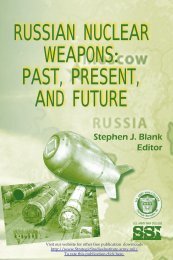The United States and China in Power Transition - Strategic Studies ...
The United States and China in Power Transition - Strategic Studies ...
The United States and China in Power Transition - Strategic Studies ...
You also want an ePaper? Increase the reach of your titles
YUMPU automatically turns print PDFs into web optimized ePapers that Google loves.
cieties, penetrat<strong>in</strong>g <strong>in</strong>to economics, politics, culture,<br />
<strong>and</strong> many other areas, generat<strong>in</strong>g profound changes<br />
<strong>in</strong> these areas. <strong>Ch<strong>in</strong>a</strong> pays a heavy price for its leaders’<br />
refusal to heed these valuable observations.<br />
THE CHINA THREAT<br />
In addition to mak<strong>in</strong>g its modernization drive<br />
cumbersome, <strong>Ch<strong>in</strong>a</strong>’s uneasy transition to modernity<br />
has external consequences as well. <strong>The</strong> biggest<br />
problem is perhaps the perpetuation of <strong>Ch<strong>in</strong>a</strong> as an<br />
outsider to the U.S./West-led <strong>in</strong>ternational system.<br />
Although <strong>Ch<strong>in</strong>a</strong>’s economy <strong>and</strong> many other aspects of<br />
the nation have been gradually <strong>in</strong>tegrated with those<br />
of the outside world, its way of government is still out<br />
of place with the prevail<strong>in</strong>g democratic <strong>in</strong>stitutions <strong>in</strong><br />
this <strong>in</strong>ternational system. This outsider problem keeps<br />
<strong>Ch<strong>in</strong>a</strong> <strong>in</strong> the dissatisfied group of the <strong>in</strong>ternational system<br />
(<strong>in</strong> the shaded area of Figure 2-1), largely because<br />
Ch<strong>in</strong>ese leaders do not share their core political values<br />
with their counterparts <strong>in</strong> the world’s lead<strong>in</strong>g states.<br />
Thus when <strong>Ch<strong>in</strong>a</strong> started its upward development, it<br />
automatically became a threat to the U.S./West-led<br />
<strong>in</strong>ternational system.<br />
<strong>The</strong> <strong>United</strong> <strong>States</strong> has been watch<strong>in</strong>g closely <strong>and</strong><br />
with great concern about the changes <strong>in</strong> <strong>Ch<strong>in</strong>a</strong>. Interest<strong>in</strong>gly,<br />
the <strong>United</strong> <strong>States</strong> was <strong>in</strong>strumental <strong>in</strong><br />
br<strong>in</strong>g<strong>in</strong>g about <strong>Ch<strong>in</strong>a</strong>’s <strong>in</strong>itial changes. Forty years<br />
ago (with President Richard Nixon’s historic visit to<br />
<strong>Ch<strong>in</strong>a</strong> <strong>in</strong> 1972), the <strong>United</strong> <strong>States</strong> brought <strong>Ch<strong>in</strong>a</strong> out<br />
of its self-imposed isolation, <strong>and</strong> <strong>in</strong> subsequent years<br />
helped with <strong>Ch<strong>in</strong>a</strong>’s economic development (by way<br />
of substantial American bus<strong>in</strong>ess <strong>in</strong>vestment <strong>in</strong> <strong>Ch<strong>in</strong>a</strong><br />
<strong>and</strong> provid<strong>in</strong>g Ch<strong>in</strong>ese bus<strong>in</strong>ess the critical access to<br />
the U.S. <strong>and</strong> worldwide markets along the way). <strong>The</strong><br />
50

















